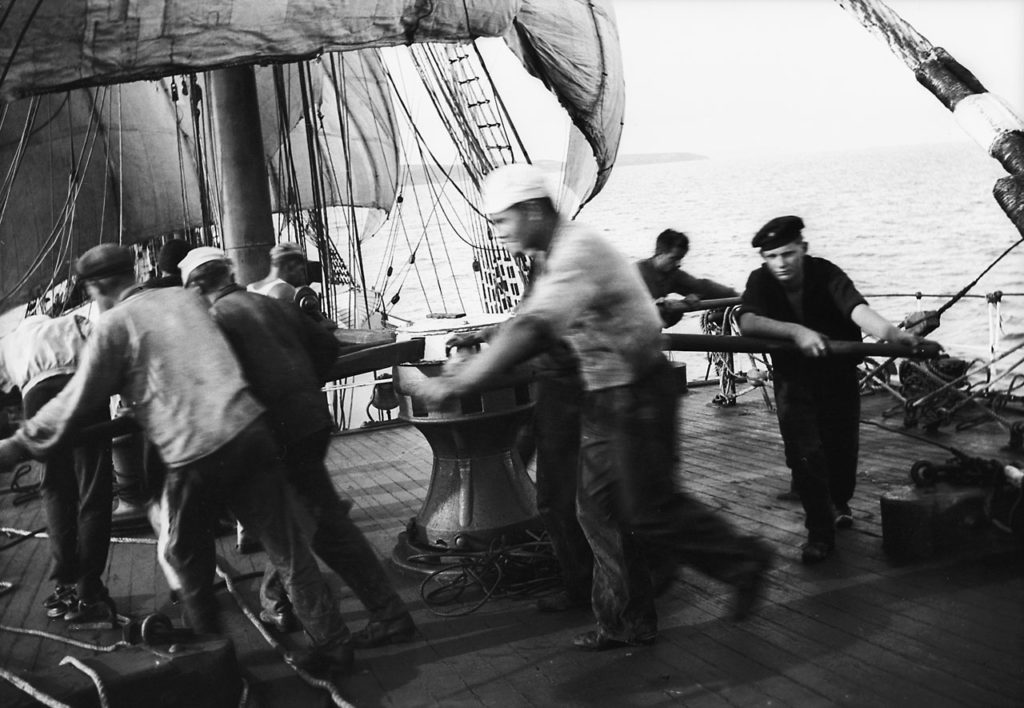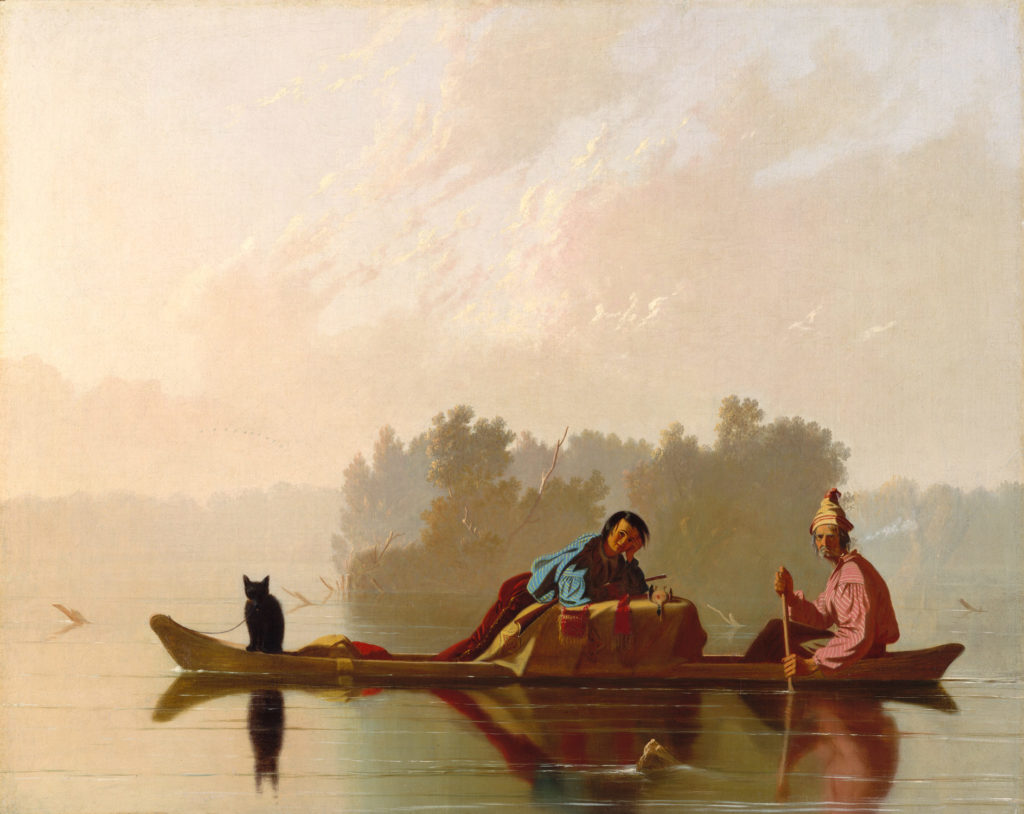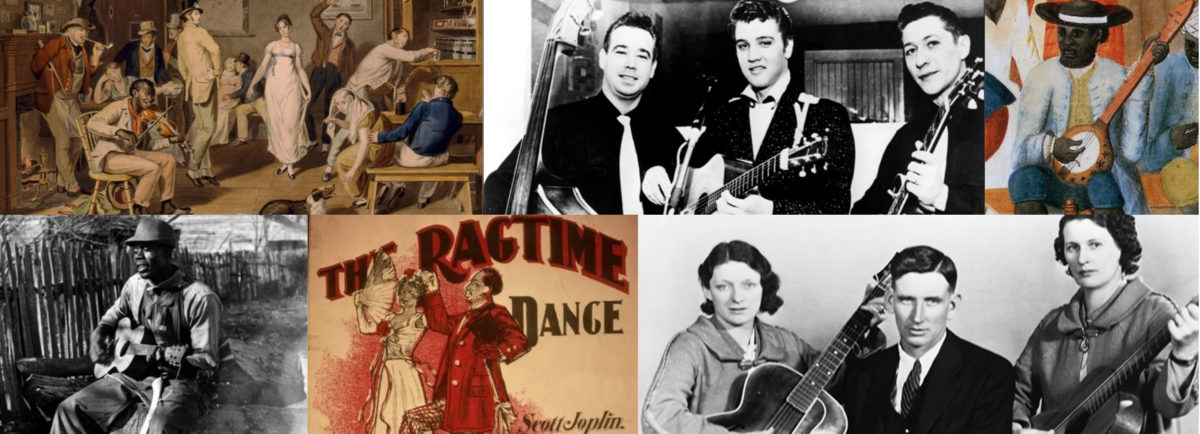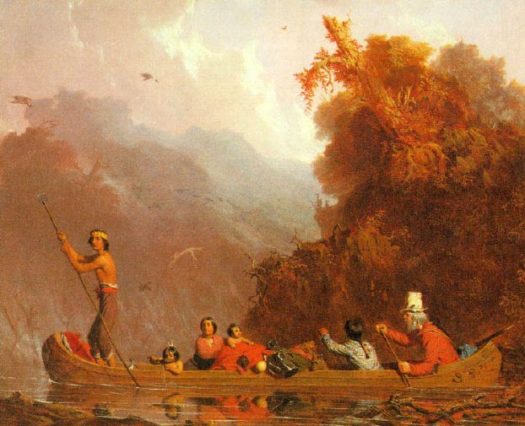Overview
There are few melodies as recognizable as that of the American folk song "Shenandoah." As with most folk songs, there are many different variations and versions, and it is impossible to determine the song's exact origin. It has commonly been sung as a sea shanty (also spelled chantey or chanty), though it most likely originated with early French Canadian fur traders.
Versions of the song have linked it to riverboat men, cavalry men, mountain men, and soldiers on both sides of the Civil War. Some use names, including Sally Brown, Polly Brown, Darby Doyle, Paddy Doyle, or Dan O'Shea, in place of the word Shenandoah.
In summing up the beauty and appeal of the song, John and Alan Lomax write in their book Best Loved American Folk Songs:
The melody has the roll and surge and freedom of a tall ship sweeping along before a trade wind. The sonorous succession of long vowels and soft and liquid consonants blend perfectly with the romantic air. The lines are a call from the homeland to the sailor wandering far out across the seas, a call not from a sweetheart, a house, or even a town, but from the land itself, its rivers and its familiar and loved hills.
"Shenandoah" was one of the most popular capstan shanties. Songs such as this set an appropriate, manageable pace and inspired the sailors to accomplish the task at hand, which could be quite long in duration.

Song History
The song first appeared in writing as "Shenadore" in The New Dominion Monthly in April, 1876. The author, Captain Robert Chamblet Adams, indicated that he had first heard the song around 1850. W.B. Whall reprinted it in his 1910 book Ships, Sea Songs and Shanties Collected by W.B. Whall, Master Mariner. The lyrics tell the story of a canoeing voyageur, or fur trader, who was in love with the daughter of a Native American chief.
This earliest known version of the song likely originated with French Canadian voyageurs who traded with Native Americans around the Great Lakes starting in the 16th century. The voyageurs gave weapons, tools, and money in exchange for animal furs, especially beaver pelts. They often sang while they paddled their canoes along the Mississippi River and its tributaries, including the Missouri, in the quest for furs.

Most musicologists agree that the chief mentioned in "Shenandoah" is the Oneida Iroquois chief John Skenandoa. Skenandoa supported the English against the French in the Seven Years (or French and Indian) War. Support for the English may be the reason that the chief forbade the love between his daughter and the French trader, if the story in this early version of "Shenandoah" is true.
Missouri, she's a mighty river.
Away you rolling river.
The redskins' camp, lies on its borders.
Ah-ha, I'm bound away, 'Cross the wide Missouri.
The white man loved the Indian maiden,
Away you rolling river.
With notions his canoe was laden.
Ah-ha, I'm bound away, 'Cross the wide Missouri.
"O, Shenandoah, I love your daughter,
Away you rolling river.
I'll take her 'cross yon rolling water."
Ah-ha, I'm bound away, 'Cross the wide Missouri.
The chief disdained the trader's dollars:
Away you rolling river.
"My daughter never you shall follow."
Ah-ha, I'm bound away, 'Cross the wide Missouri.
At last there came a Yankee skipper.
Away you rolling river.
He winked his eye, and he tipped his flipper.
Ah-ha, I'm bound away, 'Cross the wide Missouri.
He sold the chief that fire-water,
Away you rolling river.
And 'cross the river he stole his daughter.
Ah-ha, I'm bound away, 'Cross the wide Missouri.
"O, Shenandoah, I long to hear you,
Away you rolling river.
Across that wide and rolling river."
Ah-ha, I'm bound away, 'Cross the wide Missouri.
(from Ships, Sea Songs and Shanties Collected by W.B. Whall, Master Mariner)
Flatboatmen carrying goods on the American rivers in the early 19th century may also have sung versions of "Shenandoah." Sailors on packet ships along the Mississippi River sang it while they hauled in the anchor. Eventually, sailors on American clipper ships carried the song around the world.
In the book American Ballads and Folk Songs (Macmillan, 1934), John and Alan Lomax include a version called "The Wild Mizzourye." They identify this as a version sung by U.S. Cavalrymen in the American West.
For seven long years I courted Nancy
Hi! Ho! The rolling river!
For seven long years I courted Nancy
Ha! Ha! I'm bound away for the wild Mizzourye!
She would not have me for a lover
Hi! Ho! The rolling river!
She would not have me for a lover
Ha! Ha! I'm bound away for the wild Mizzourye!
And so she took my fifteen dollars
Hi! Ho! The rolling river!
And so she took my fifteen dollars
Ha! Ha! I'm bound away for the wild Mizzourye!
And then she went to Kansas City
Hi! Ho! The rolling river!
And then she went to Kansas City
Ha! Ha! I'm bound away for the wild Mizzourye!
And there she had a little sh-sh-baby
Hi! Ho! The rolling river!
And there she had a little sh-sh-baby
Ha! Ha! I'm bound away for the wild Mizzourye!
She must have had another lover
Hi! Ho! The rolling river!
She must have had another lover
Ha! Ha! I'm bound away for the wild Mizzourye!
He must have been a _th Cavalry Soldier
Hi! Ho! The rolling river!
He must have been a _th Cavalry Soldier
Ha! Ha! I'm bound away for the wild Mizzourye!
I'm drinkin' rum and chawin' tobacco
Hi! Ho! The rolling river!
I'm drinkin' rum and chawin' tobacco
Ha! Ha! I'm bound away for the wild Mizzourye!
I learned this song from Tommy Tompkins
Hi! Ho! The rolling river!
I learned this song from Tommy Tompkins
Ha! Ha! I'm bound away for the wild Mizzourye!
(from American Ballads and Folk Songs by John and Alan Lomax)
Carl Sandburg provides a version with some similar stanzas in his book The American Songbag (Harcourt Brace Jovanovich, 1927). He indicates that "The Wide Mizzoura" was sung by regular army men by 1897. Instead of the word "Shenandoah," Sandburg's version uses "Shannadore."
In his book Splendour of the Seas (E. Stanford, 1953) Captain Frank H. Shaw includes the following version, which celebrates the Shenandoah River and Valley of Virginia and West Virginia.
O Shenandoah, I long ter hear yer
O Shenandoah, I long ter hear yer
O Shenandoah, I look a-notion
To sail across the stormy ocean
O Shenandoah, I'm bound ter leave yer
But, Shenandoah, I'll not deceive yer
O Shenandoah, I love yer daughters
I love the music of yer waters
'Tis seven long years since last I seed yer
But, Shenandoah, I'll never grieve yer
O Shenandoah's my native valley
Beside her waters I love to dally
O Shenandoah, she's a lovely river
An' I shall never forget you ever
(from Splendour of the Seas by Captain Frank H. Shaw)
America's familiarity with "Shenandoah" soared in the 1960s when it was featured in at least two popular films. How the West was Won (1962) linked the song with the American West, and Shenandoah (1965) connected it to the Civil War.
Matthew Sabatella and the Rambling String Band's version includes the lyrics from John and Alan Lomax's Folk Song U.S.A. (Duell, Sloan & Pearce, Inc., 1947).
Lyrics
reprinted from John and Alan Lomax's Folk Song U.S.A. (Duell, Sloan & Pearce, Inc., 1947)
O Shenandoah, I long to hear you
Away, you rolling river
O Shenandoah, I long to hear you
Away, I'm bound away
'Cross the wide Missouri
Missouri, she's a mighty river
Away, you rolling river
The Indians camp along her borders
Away, I'm bound away
'Cross the wide Missouri
The white man loved an Indian maiden
Away, you rolling river
With notions his canoe was laden
Away, I'm bound away
'Cross the wide Missouri
O Shenandoah, I love your daughter
Away, you rolling river
For her I've crossed the rolling water
Away, I'm bound away
'Cross the wide Missouri
Seven long years I courted Sally
Away, you rolling river
Seven more I longed to have her
Away, I'm bound away
'Cross the wide Missouri
Farewell, my dear, I'm bound to leave you
Away, you rolling river
O Shenandoah, I'll not deceive you
Away, I'm bound away
'Cross the wide Missouri
Playlists
Apple Music
Spotify
YouTube
Further Reading
Bullen, Frank Thomas. Songs of Sea Labour: Chanties. Forgotten Books, 2016.
Lomax, John A., and Alan Lomax. American Ballads and Folk Songs. Dover Publications, 1994.
Lomax, John A, and Alan Lomax. Folk Song U.S.A. Meredith, 1947.
Sandburg, Carl. The American Songbag. Harcourt Brace Jovanovich, 1990.
Schreffler, Gibb. Boxing the Compass: A Century and a Half of Discourse About Sailor’s Chanties. Black Willow Press, 2018.
Shaw, Frank H. Splendour of the Seas. E. Stanford, 1953.
Whall, W. B. Ships, Sea Songs and Shanties - Collected by W. B. Whall, Master Mariner. Forgotten Books, 2018.


